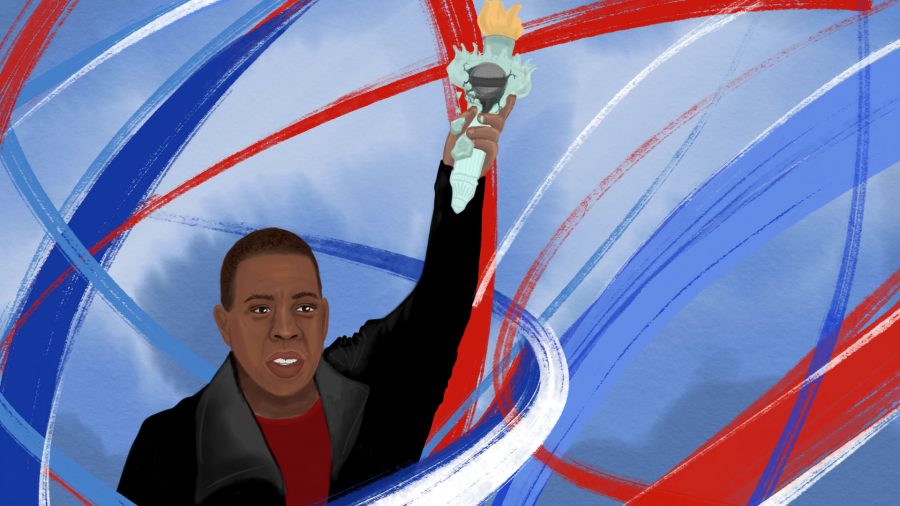“Son do you know why I’m stopping you for,” music artist and Grammy-winner Shawn “Jay-Z” Carter rapped in his 2004 song “99 Problems”. “Cause I’m young and I’m black and my hat’s real low.”
For Jay-Z, music has always acted as a medium to address social and political currents; in “99 Problems,” Jay-Z comments on institutional racism and mass incarceration.
His most recent 2017 album “4:44” discussed current racial and financial tensions.
“I feel like whenever there is strife and when there is trouble in the world, it is the position and the duty of the artists to speak to the times,” Jay-Z said. “Music and musicians [are] microcosms of society.”
Jay-Z said this intersection between music and politics is not new.
The ’80s crack epidemic greatly influenced music, popularizing rap groups like Public Enemy and A Tribe Called Quest, he said. In the decades before, Joan Baez’s “We Shall Overcome” and other music fueled the anti-war and Civil Rights Movement, according to Billboard.
“Half the reason I love rapping is because I can speak my mind,” Jay-Z said. “All the most influential artists in history had something to say: Bob Marley, Marvin Gaye, Aretha Franklin. I strive, like they were, to be the voice of an era.”
Protest music waned in the early 2000s, music critic Dorian Lynskey said in his 2011 book “33 Revolutions Per Minute: A History of Protest Songs.”
However, in a recent interview with The Atlantic, Lynskey said there has recently been a new wave of politically-influenced music directed at the current administration.
“The benighted presidency of Donald Trump might be the most powerful spur to protest that the U.S has ever seen,” Lynskey wrote in a Guardian article.
The Los Angeles Times published a series this year called “The New Sounds of Protest,” circling around this music-based movement, which features music from artists such as Kendrick Lamar and Kamasi Washington.
Will Safferstein ’20 said he has noticed this growing tide of musical expression.
“I think we hear about [politics] more nowadays because people are more frustrated than in years past,” Safferstein said. “It’s a good way for them to express themselves and it leads to some really good music being made.”
Jeff Harleston (Chase ’20), General Counsel and Executive Vice President of Business and Legal Affairs for Universal Music Group, said he works to promote these types of messages to the public.
“As a society, we have always relied on recording artists to be our conscience, to challenge societal norms and to speak for those whose voice has been drowned out,” Harleston said. “An important aspect of my job is helping our artists share their voices and their message with the world.”
Jay-Z said music provides a unique way to bridge recurring social issues, which is something he said he noticed politicians tend not to do. He has also noticed that music increasingly comments on racism and mass incarceration, which is rooted deeply in slavery and racial tensions.
“It’s people not identifying with our similarities but identifying with our differences that is causing strife,” Jay-Z said. “Whether it’s difference in religion, difference in race or difference in sexual preference, whatever differences we have, people are focused on that rather than our humanity. Musicians put it into a package and say, ‘Here, this is exactly what is going on.’”
On the other hand, this surge of political music has also affected artists negatively, Lynsky said in the interview. Lynsky said that musician Randy Newman cut one of his songs commenting on the current administration from his latest album because he did not want to give the president any more “airtime.”
“That’s an interesting thing because I don’t think that’s happened before,” Lynsky said. “I don’t think people were exhausted by songs about [Ronald] Reagan or [Margaret] Thatcher.”
Aspiring rapper Cassius Bythewood ’19 said some artists may feel disincentivized to comment on politics, as it prevents lesser-known artists from gaining recognition.
“[A lot] of hip-hop music promotes a lot of negative subjects such as drugs, violence and misogyny,” Bythewood said. “Because that is in style, bringing something different to the table can make it difficult to build a youthful audience. However, I believe it is an artist’s job to challenge and talk about the current climate of the world, and politics is a part of that.”
On the other hand, Carissa Edwards-Mendez ’19 said she believes that music should not always merge with the artists’ political opinions.
“I don’t always want to think about politics when I listen to music,” Edwards-Mendez said. “I have to be in a certain frame of mind when I am talking about politics because it just reminds me how reality is just really sad sometimes. For me, music is an escape from reality.”
In today’s political climate, music and politics are ideologically opposed, Edwards-Mendez said.
“Music transcends music,” Edwards-Mendez said. “It is about lifting people together, where politics in today’s America is about dividing people across political lines. In music, there are no divisions. It is an art from that allows you to feel free and explore as much as possible.”
Jay-Z acknowledged that artists must balance their political expression in music.
“Once the music becomes too much, people just shut it down, and they can’t listen to it anymore,” Jay-Z said. “Everything needs balance. There is value in being entertained.”
Although Jay-Z mixes activism with his art, he said music serves as a form of self-expression that should not be limited to politics.
“[For me,] my truth and the reason for why I became a musician comes first,” Jay-Z said. “It comes what I’m feeling right now, and the music is my expression of this feeling.”































